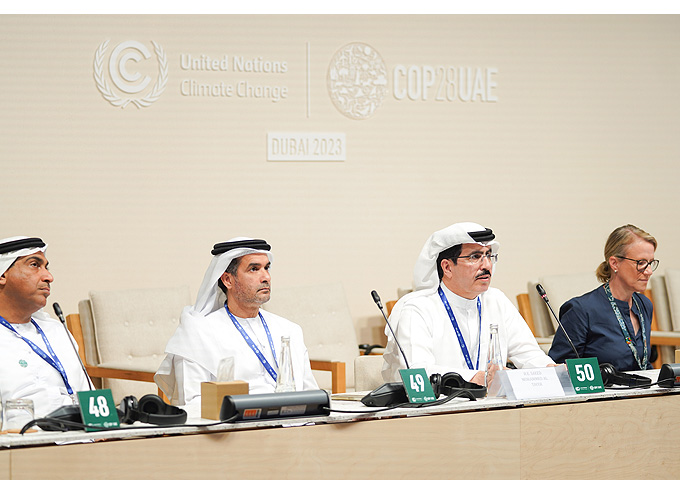10 December 2023
HE Saeed Mohammed Al Tayer highlights the role of utilities in enhancing the resilience of urban water systems
During COP28
During COP28

In his keynote speech in a session entitled “Utilities as a Key Driver of Urban Water Resilience,” HE Saeed Mohammed Al Tayer, MD and CEO of Dubai Electricity and Water Authority (DEWA), confirmed that DEWA has an integrated strategy to enhance efficiency and sustainability in water production and use. It adopts a holistic perspective covering the entire water cycle of production, transmission and distribution, ensuring a responsible and forward-thinking approach. Al Tayer pointed out the role of utilities in enhancing the resilience of urban water systems to cope with urban expansion The global demand for water resources has reached unprecedented levels to meet the rapid urban expansion, which requires a radical shift in the approach to water management within the framework of a comprehensive transition to growth and a sustainable green economy.
Al Tayer made these remarks during a session organised by the Presidency of the 28th Conference of the Parties, the German Federal Ministry for Economic Cooperation and Development, the Dutch Ministry of Foreign Affairs, the World Bank/International Finance Corporation, and Water Equity/Water.org during COP28 at Expo City Dubai.
“I am honoured to extend a warm welcome to you all as we gather today to delve into a topic of paramount importance – "Utilities as a Key Driver of Urban Water Resilience." As we stand at the intersection of escalating urbanisation and the ever-increasing challenges posed by water scarcity worldwide, it is indeed fitting to recognize the pivotal role that utilities play in fortifying the resilience of our urban water systems. In the face of rising urbanisation, global demand for water resources has reached unprecedented levels, necessitating a paradigm shift in the water management approach within the overall transition to growth and a green sustainable economy,” said Al Tayer.
“Urban utilities are uniquely positioned to spearhead this transformation. They form the backbone of our urban infrastructure, facilitating the reliable and sustainable provision of clean and safe water to communities. Dubai Electricity and Water Authority (DEWA) aligns its practices with the UN Sustainable Development Goals (SDGs) 2030, to reduce environmental impact and strengthen the resilience of both energy and water systems in line with Goal 6 of the UN SDGs "Ensure access to water and sanitation for all. In the heart of Dubai's dynamic landscape, DEWA stands as a beacon of progressive leadership in the realm of utilities in terms of producing and providing water. Today, I would like to highlight DEWA's relentless efforts in fostering resilience, including climate resilience, within urban water systems. In an era defined by environmental challenges, DEWA has risen to the occasion, charting a course that emphasizes not only efficiency but also the enduring sustainability of our precious water resources. DEWA has achieved a prominent position, becoming a role model for other utilities,” added Al Tayer.
“DEWA has an integrated strategy to enhance efficiency and sustainability in water production and use. It embraces a holistic perspective covering the entire water cycle of production, transmission and distribution, ensuring a responsible and forward-thinking approach. To enhance Water Security, DEWA has undertaken several initiatives and projects to produce, distribute, and store desalinate water in Dubai. DEWA is also implementing a project to store desalinated water and recover it when needed. The Aquifer Storage and Recovery (ASR) project, which on completion in 2025, will be the world's largest of its kind, capable of storing 6000 million imperial gallons of potable water, providing the Emirate with a strategic reserve to supply over 50 million imperial gallons of water per day for 90 days during emergencies. The storage capacity of desalinated water after the completion of the reservoirs will be 7212 million gallons by 2025. We also have connectivity with water transmission networks in neighbouring emirates and emergency groundwater production capacity. This underscores our commitment to enhancing overall water security and stay ahead of the steady increase in demand,” said Al Tayer.
“Advanced Technologies play a pivotal role in DEWA's water infrastructure management. Through the utilisation of smart technologies like advanced sensors and data analytics (SCADA), DEWA ensures real-time monitoring, efficient resource management and swift response to any disruption. Our world record low line loss of 4.5% compared to 15% in North American utilities, is a testament to the efficiency and reliability of our water transmission and distribution network. DEWA is also committed to integrating renewable energy with our water desalination process, especially the use of solar energy and adoption of reverse osmosis technology, which significantly enhances sustainability. According to the strategy, 100% of Dubai’s desalinated water production in 2030 will come from clean and renewable energy sources,” continued Al Tayer.
“Research and Innovation play a major role in developing our water management strategy. DEWA is continually exploring innovative solutions for improving water desalination processes, monitor infrastructure and enhance overall system resilience through DEWA’s Research & Development Centre. We are partnering with international organizations, utilities and research institutions to collaborate and stay informed about global advancements in water management and associated technologies. DEWA has successfully leveraged public-private partnership to facilitate construction of the 180 MIGD Hassyan desalination plant based on Sea Water Reverse Osmosis (SWRO) and costing AED 3.357 billion. The plant being developed under Independent Water & Power Producer (IWPP) model, is highly efficient and will sustainably produce water at a world record low cost of USD 0.36536/m3,” noted Al Tayer.
“As we navigate the challenges of water management in the 21st century, DEWA reiterates its commitment to Integrated Water Management, technological innovation, renewable energy integration and community engagement to sustainably meet the future water requirement of our communities and the planet at large,” concluded Al Tayer.

